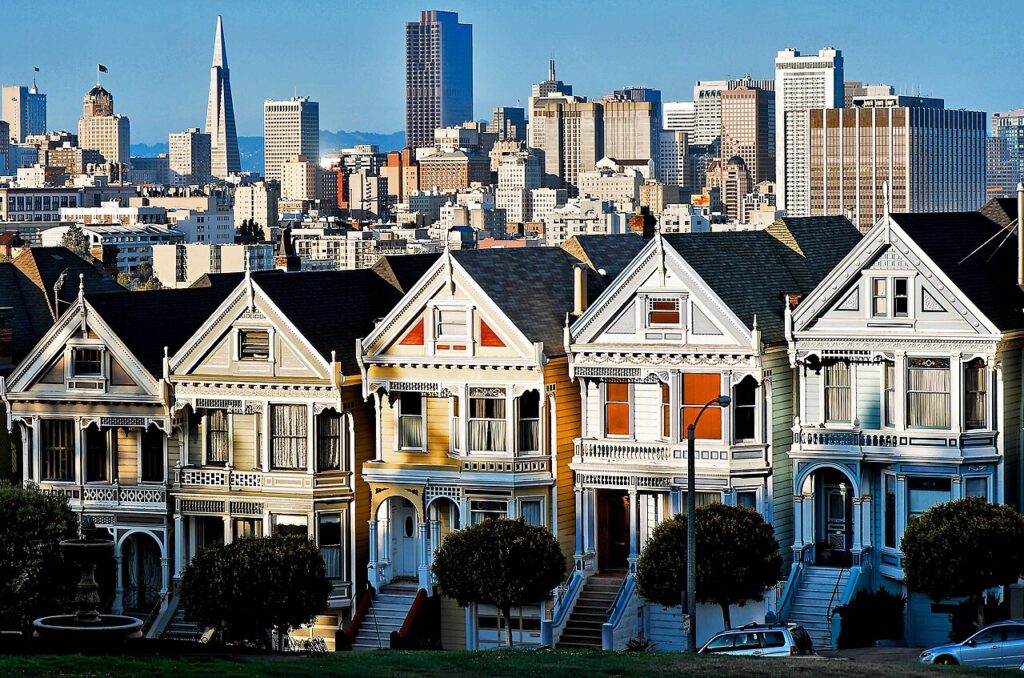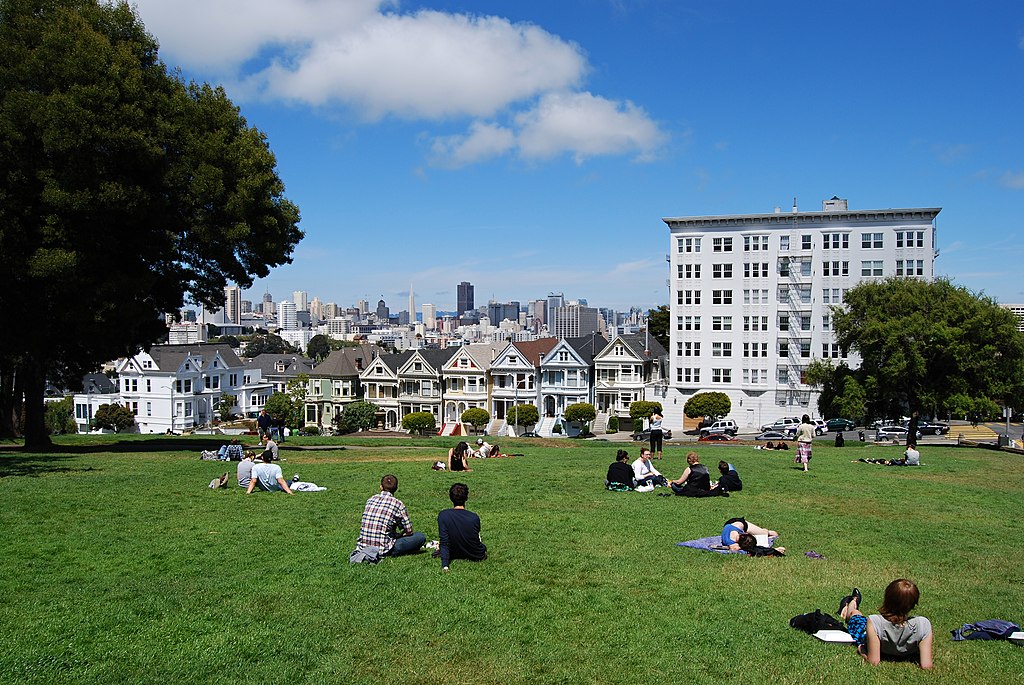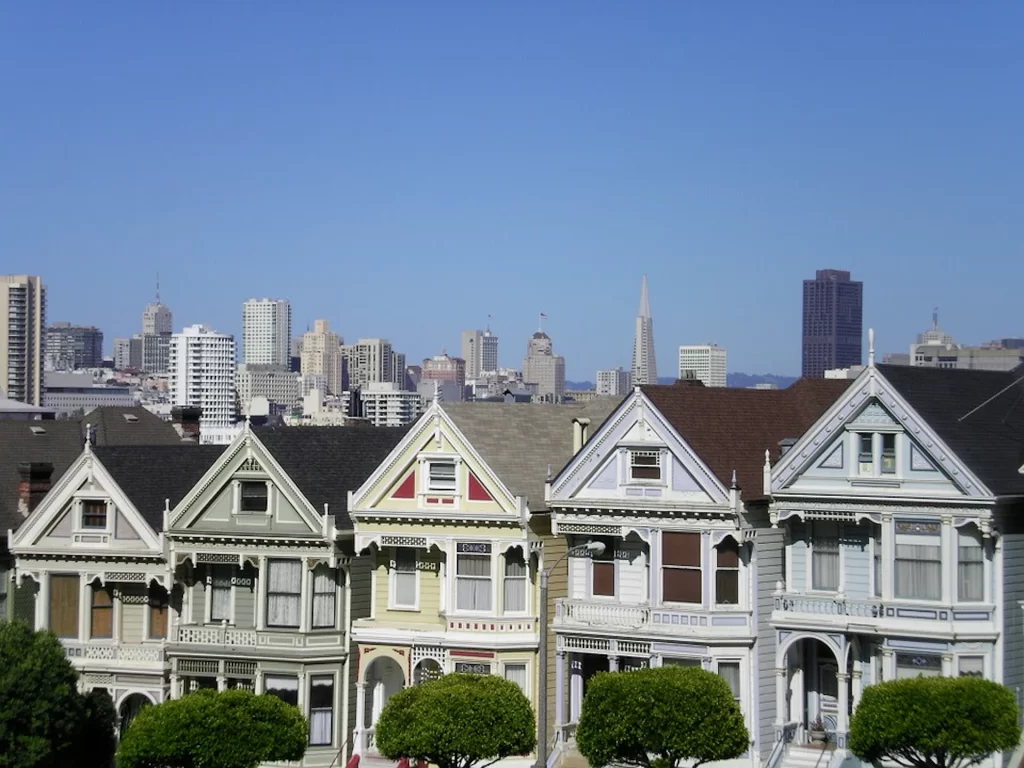CALL US! 1-415-766-2722
Fun@SanFranciscoJeepTours.com
San Francisco is a city known for its stunning landmarks and vibrant neighborhoods, but one sight that truly captures the essence of its charm is the world-famous Painted Ladies. These iconic pastel-colored Victorian homes, also known as “postcard row,” stand proudly on the slopes of Steiner Street, overlooking the breathtaking Alamo Square Park. In this blog post, we’ll uncover fascinating facts about the Painted Ladies, explore their cinematic fame, provide visitor information, and reveal the stories that make them truly unique. So, grab your camera and get ready for an adventure filled with whimsy and delight!
The Origins of the Name Contrary to popular belief, the nickname “Painted Ladies” doesn’t specifically refer to these particular homes but rather to any set of Victorian or Edwardian houses featuring three or more colors. The term gained popularity in 1978 when authors Elizabeth Pomada and Michael Larsen wrote a book highlighting the unique architectural style of these vibrant homes.
How to Find the Painted Ladies: Visiting the Painted Ladies is a must-do for any traveler exploring San Francisco. To get there, hop on the westbound #5 Muni bus from most downtown or Union Square hotels and exit at McAllister and Pierce Streets. From there, take a short stroll to the eastern side of Alamo Square Park, where the Painted Ladies stand proudly. The sight of these vibrant homes against the city skyline will take your breath away.
Painted Ladies can be found across the Country. While the Painted Ladies in San Francisco may be the most famous, they are not alone. Similar architectural delights, often referred to as Painted Ladies, can be found in cities across the United States. From Cape May in New Jersey to Baltimore in Maryland, St. Louis in Missouri, and even Cincinnati and Toledo in Ohio, these colorful homes add charm and vibrancy to neighborhoods across the nation.
Did you know? The Hidden Gem: A Museum Among the Ladies
Did you know that one of the Painted Ladies houses a tiny museum on its top floor? The second-to-last home in the row holds a delightful collection of artifacts that offers a glimpse into San Francisco’s rich history. Explore a ticket from the day the Golden Gate Bridge opened, photographs of Alamo Square Park during the devastating 1906 earthquake, century-old wedding cake tops, and even clothing from the 1800s. It’s a hidden gem that adds an extra layer of fascination to your visit.

The symbolism of the Painted Ladies Beyond their architectural beauty, the Painted Ladies hold a unique symbolism. These grand homes are symbolic of the famous California Gold Rush era. As newfound wealth flooded into the city, builders sought to display their prosperity through elaborate residences. With their dramatic windows, adorned rooflines, and charming turrets, the Painted Ladies stand as a testament to the opulence and ambition of the time.
Did You Know? Part of the Colorist Movement:
A Kaleidoscope of Hues The vibrant colors that grace the Painted Ladies are part of a larger movement known as the colorist movement. In the 1960s, a local artist named Butch Kradum took it upon himself to bring life and vibrancy to the city’s gray homes. He began painting houses in bold blues and greens, breaking free from the drab monotony. His audacious choice caught on, and soon other artists and homeowners joined the movement, transforming the cityscape into a kaleidoscope of hues. By the 1970s, San Francisco was adorned with bright and cheerful homes, adding an extra layer of whimsy to its streets.
The Painted Ladies in San Francisco, including the iconic row at 710-720 Steiner Street, appeared in the TV show “Full House” (1987-1995) and its sequel “Fuller House” (2016-2020), becoming famous landmarks of the series.

Painted Ladies are part of Movie and TV Magic: Painted Ladies on the Silver Screen The Painted Ladies have enjoyed their fair share of Hollywood stardom. They have graced the screen in various movies and TV shows, adding a touch of whimsy to the cinematic landscape. From the romantic comedy “The Five-Year Engagement” to the science fiction classic “Bicentennial Man,” these colorful homes have become beloved symbols of San Francisco’s architectural heritage. Notably, the iconic row has made appearances in the popular TV series “Full House” and movies like “So I Married an Axe Murderer” and “The Woman in Red.” Lights, camera, Painted Ladies!
“Painted Ladies” refers to any group of Victorian or Edwardian homes with at least three or more colors, making them a joyful and colorful sight to behold!
San Francisco’s love affair with colorful homes began during the Victorian and Edwardian eras, with an astonishing 48,000 houses constructed between 1849 and 1915. These architectural wonders were like a box of crayons gone wild! As one cheeky newspaper critic quipped in 1885, the city was a riot of colors: “Red, yellow, chocolate, orange… everything that is loud is in fashion.” Talk about a vibrant cityscape!
While the luxurious mansions of Nob Hill met their match in the infamous 1906 earthquake, the resilient spirit of San Francisco persevered. Thousands of modest yet charming homes survived in the western and southern neighborhoods, standing as a testament to the city’s enduring character.
These painted beauties weren’t afraid to embrace their eccentricities. From striking reds to blues that could make the sky jealous, the houses were a colorful spectacle. They took fashion risks, sporting uncouth panels of yellow and brown that somehow managed to make an endearing impression.
Painted Ladies,” also known as the Seven Sisters or “Postcard Row.” Built between 1892 and 1896 by the skillful builder Matthew Kavanaugh, these architectural darlings shine in the San Francisco skyline. And guess what? Kavanaugh himself resided next door in the splendid 1892 mansion at 722 Steiner Street
 See San Francisco Like Never Before – Private Jeep Tour!
See San Francisco Like Never Before – Private Jeep Tour!See the city’s top sights on your terms with a Private Jeep Tour! Your personal guide takes you to San Francisco’s must-see locations, ensuring unforgettable views and photo stops—including a breathtaking drive across the Golden Gate Bridge.
Why settle for an ordinary tour? —Book your Jeep sightseeing adventure now!

A visit is more than just admiring the homes. Take your time to soak in the beauty of the surroundings. As the sun begins to set, the golden glow casts a magical aura over the Painted Ladies, creating the perfect backdrop for unforgettable photographs. Explore the park’s lush lawns, perfect for picnics and outdoor activities.
In the neighborhood surrounding the Painted Ladies, you’ll find a treasure trove of experiences. Head east to Hayes Valley, where boutiques and excellent restaurants await. Venture further to the Fillmore district, known for its historic music venues and high-end retail options. And just west of the park, Divisadero Street beckons with its array of shops, eateries, bars, and vibrant nightlife. Travel north along Divisadero to discover Pacific Heights and the Marina, or head south to explore the Castro and Noe Valley. The possibilities are endless.
The Painted Ladies of San Francisco are more than just houses; they are vibrant expressions of history, art, and community. From their fascinating nickname to their starring roles in movies, these whimsical homes have captured the hearts and imaginations of visitors from around the world. As you stroll along Steiner Street, take in the awe-inspiring sight of the Painted Ladies against the backdrop of the city’s skyline. Explore the neighborhood, immerse yourself in the local culture, and create memories that will last a lifetime. The Painted Ladies of San Francisco are a true testament to the city’s rich heritage and enduring charm.
The Painted Ladies are some of San Francisco’s most recognizable homes—colorful, historic, and endlessly photographed. Here are the most common questions visitors ask when learning more about these famous Victorians.
Quick intro: The name is all about color and detail.
“Painted Ladies” is a nickname for Victorian or Edwardian houses painted in three or more colors to highlight their architectural details. The term became popular after a 1978 book about San Francisco’s colorful homes.
Quick intro: The classic postcard view is easy to reach.
The best-known Painted Ladies sit at 710–720 Steiner Street, facing Alamo Square Park. From downtown or Union Square, take the westbound #5 Muni bus to McAllister and Pierce, then walk a short block to the park’s eastern side.
Quick intro: The style spread far beyond SF.
Yes. Similar colorful Victorian houses often called Painted Ladies can be found in cities across the United States, including Cape May, Baltimore, St. Louis, Cincinnati, Toledo, and others.
Quick intro: A lesser-known and intriguing detail.
One of the Painted Ladies reportedly houses a small private museum on its top floor, displaying artifacts like a ticket from the Golden Gate Bridge opening, historic photos of Alamo Square, and vintage memorabilia.
Quick intro: These homes tell a bigger story than just architecture.
The Painted Ladies reflect the prosperity and opulence of the late 19th-century Gold Rush era, when builders showcased new wealth with ornate facades, dramatic windows, turrets, and rich exterior colors.
Quick intro: You’ve definitely seen them on screen.
The Painted Ladies appear in the TV series Full House and Fuller House, as well as films like The Five-Year Engagement, Bicentennial Man, So I Married an Axe Murderer, and The Woman in Red.
Quick intro: SF once had an enormous stock of ornate homes.
Roughly 48,000 Victorian and Edwardian houses were built in San Francisco between 1849 and 1915, many of which later inspired the colorful Painted Ladies style.
Quick intro: The builder lived right next door.
The most famous row, often called Postcard Row or the Seven Sisters, was built between 1892 and 1896 by builder Matthew Kavanaugh, who lived next door at 722 Steiner Street.
Bottom line: The Painted Ladies are more than just pretty houses—they’re a snapshot of San Francisco’s history, creativity, and architectural flair.
